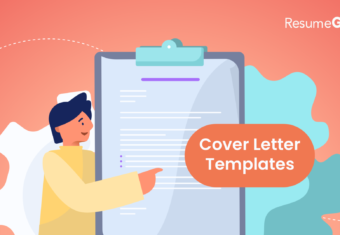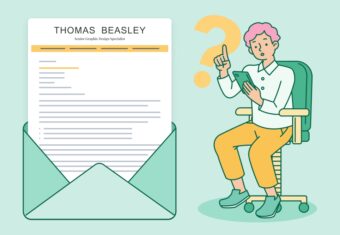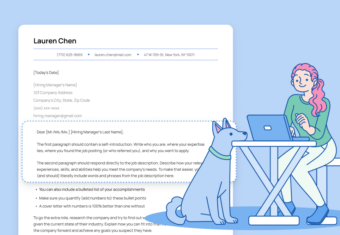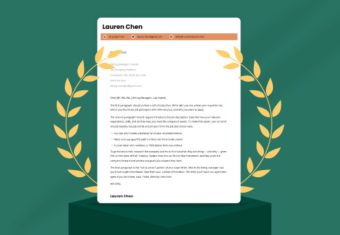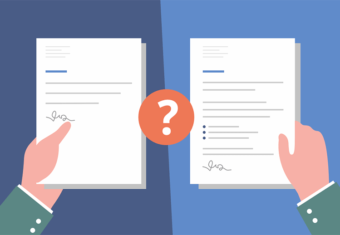The explosion of people using ChatGPT to write cover letters suggests that nobody enjoys writing one. And do hiring managers even read cover letters?
In 2023, we surveyed 625 hiring managers from across the US, to understand the importance of cover letters in the decision to offer interviews to candidates. We’ve also drawn from existing research, to provide a comprehensive list of statistics that’ll give you an edge in writing a killer cover letter.
Survey Contents:
- Expert takeaways
- Why cover letters are still important for 2024 (18 statistics)
- How a great cover letter can give you an edge (16 statistics)
- How to write an effective cover letter (13 statistics)
Expert takeaway: cover letters are as important as ever
- Cover letters are required at nearly half of the companies we surveyed. And if you’re applying to a medium to large company, the chances are even higher you’ll need one.
Because larger companies receive more applications per open position, larger companies use cover letters to differentiate between applicants with similar qualifications — they allow candidates to highlight their unique skills, experiences, and motivations, which may not be evident in their resumes
- Hiring managers definitely read cover letters — 83% read the majority that they receive. And even at companies that don’t require cover letters, 73% of hiring managers read them anyway.
- The vast majority of hiring managers (94%) think cover letters are influential when deciding who to interview. Hiring managers from medium and large companies find cover letters are especially important, with 34% of these hiring managers reporting that cover letters are very important.
- Hiring managers do more than just skim your cover letter. Over 60% spend up to two minutes or more reading cover letters. Plus, 45% of hiring managers actually read your cover letter before your resume — meaning that cover letters should not be an afterthought of your application.
Expert takeaway: cover letters can be a tipping factor for your application
- Hiring managers agree that a persuasive cover letter can increase a weak applicant’s chances of getting an interview.
- Cover letters are just as important to hiring managers when hiring for internal positions.
- That means every kind of applicant — including career changers, first-time job seekers, and internal applicants — should submit a cover letter, even if it’s not required.
Expert takeaway: an effective cover letter is customized, concise, and starts strong
- According to hiring managers, applicants should customize their cover letter to the position and company, including:
- matching the skills in the job posting
- mentioning the company’s goals
- using the company’s name, and
- addressing the hiring manager by name, if possible.
- Applicants should aim to tailor all sections of their cover letter to the job opening — as hiring managers don’t view any one section of your cover letter as being dramatically more important than another.
- A successful cover letter is approximately 400 words and starts with an engaging introduction.
- Hiring managers overwhelmingly prefer to receive PDF files (if the format is not specified in the job posting).
Why cover letters are still important in 2024 (18 statistics)
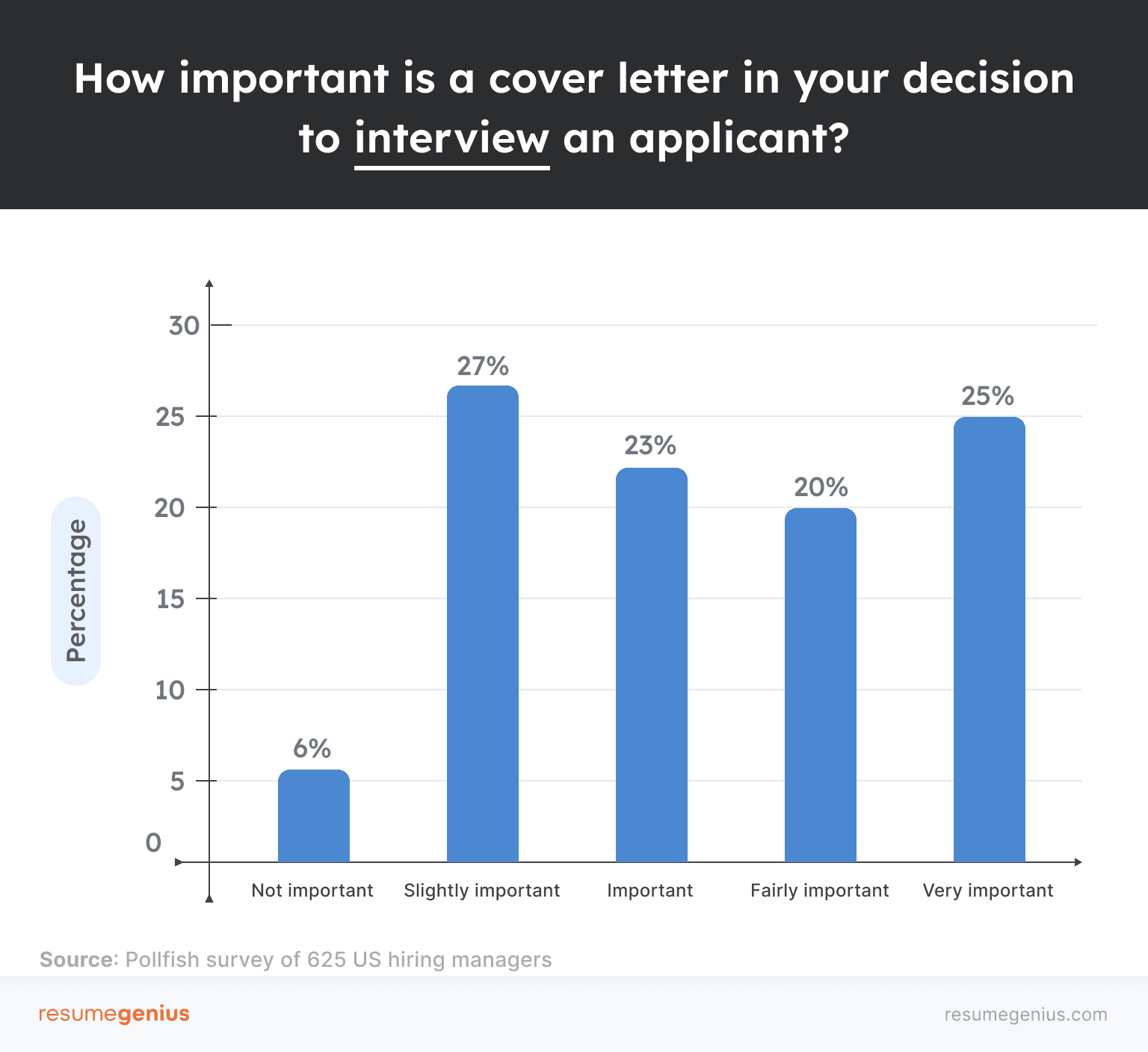
What should you do when a job posting asks for your resume, but doesn’t specify whether a cover letter is required?
Is the cover letter really optional? Or will it be a strike against you if you don’t submit one? And when it is required, do hiring managers really read them?
According to our survey of US hiring managers:
- 68% rate cover letters as important when deciding whether to invite an applicant for an interview — 1 in 4 say that cover letters are very important. Only 6% of hiring managers believe a cover letter is not important.
- Medium and large companies (100+ employees) are over twice as likely as small companies to rate a cover letter as very important (34% of medium and large companies vs. 15% of small businesses).
Do companies require cover letters?
According to our survey:
- 60% of US companies require a cover letter.
- Medium and large companies are more likely to require cover letters (72% and 69%, respectively) than small businesses (49%).
- When it comes to tech companies, start ups are more likely to require a cover letter.
According to a survey conducted by The Ladders in 2022:
- 65% of tech start-ups (1-200 employees) require a cover letter.
- 55% of medium-sized tech companies (501-1000 employees) require a cover letter.
- 48% of ‘tech giants’ (tech companies with 5000+ employees) require a cover letter.
Do hiring managers actually like cover letters?
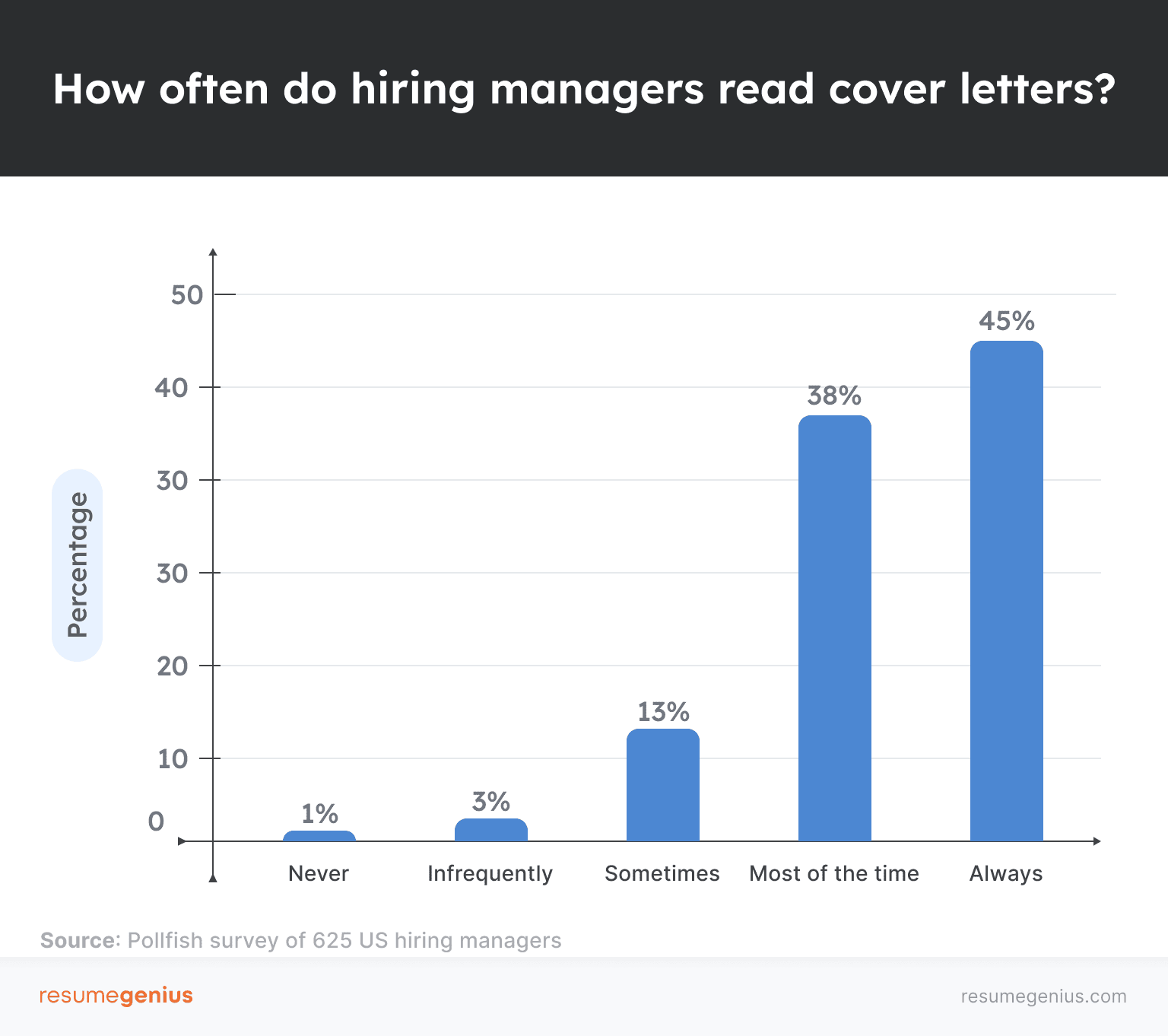
- 83% always or frequently read cover letters — only 4% never or infrequently read cover letters.
- 45% read an applicant’s cover letter before their resume.
- 36% spend less than 30 seconds reading a cover letter.
- 48% spend between 30 seconds to 2 minutes reading a cover letter.
- 15% will spend upwards of 2 minutes on a cover letter.
- Among companies who don’t require a cover letter, 73% frequently or always read them anyway.
Our survey findings are consistent with trends found in previous research:
- 78% of recruiters prefer applicants to submit a cover letter (GetCoverLetter, 2020).
- 87% of hiring managers read cover letters (ResumeGo, 2020).
- 59% of hiring managers believe a cover letter can provide valuable insight into an applicant — 38% read them out of habit or to be thorough (ResumeGo, 2020).
- 74% of hiring managers read cover letters when the job posting requires them (ResumeLab, 2019).
- 72% of hiring managers expect a cover letter — even if the job posting says doing so is “optional” (ResumeLab, 2019).
How a great cover letter can give you an edge (16 statistics)
By understanding what hiring managers are looking for from your cover letter, you can write a relevant and effective letter.
According to our survey of US hiring managers:
- 49% say a strong cover letter can convince them to interview an otherwise weak candidate.
- 18% say a weak cover letter can cause them to throw out the application of an otherwise strong candidate.
- 33% say a good letter can elevate a weak applicant, and a bad letter can hurt a strong applicant.
Our findings were consistent with previous surveys, which showed that 83% of hiring managers think a good cover letter can earn you an interview — even if your resume isn’t strong enough (ResumeLab, 2019).
Increase your chances of making a good impression by learning how to write a resume the right way and choosing the right resume format to strengthen your professional image.
What is the purpose of a cover letter?
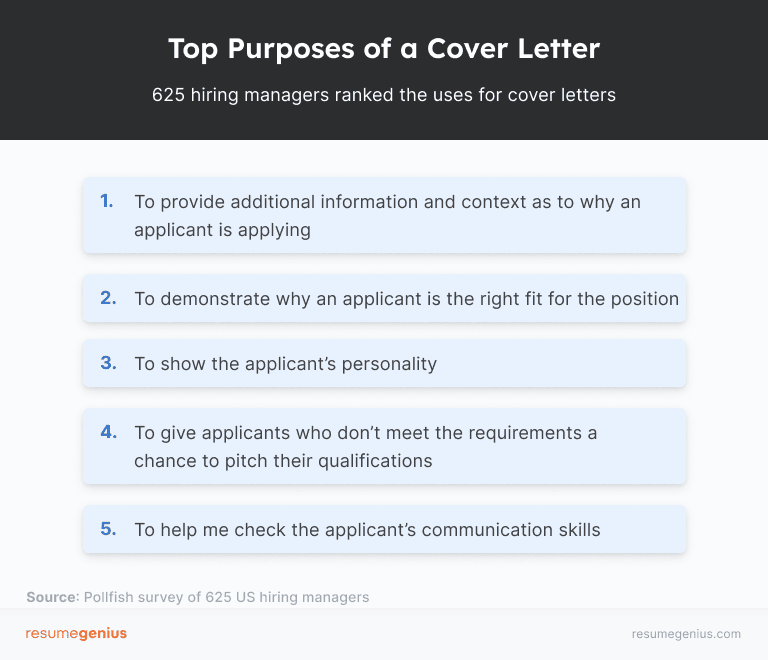
The Resume Genius survey results
- Across companies of all sizes, hiring managers report that the top purpose of a cover letter is to provide additional information and context about why a person is applying for the position. This is especially true at large companies (1000+ employees).
- At small companies (less than 100 employees), the top reason hiring managers read cover letters is to see if a candidate is the right fit for the position.
- At medium-sized companies (101-1000 employees), hiring managers say the top purpose of a cover letter is for the applicant to show their personality.
Results from previous surveys
In 2019, ResumeLab asked 200 hiring managers about the purposes of a cover letter:
- 63% said explaining your motivation for joining a company is an important purpose of a cover letter.
- 50% said outlining your career objectives is an important purpose of a cover letter.
- 50% said explaining why you’re changing careers is an important purpose of a cover letter.
- 49% said explaining gaps in your employment is an important purpose of a cover letter.
- 47% said showcasing your achievements is an important purpose of a cover letter.
In 2020, GetCoverLetter surveyed 2,000 recruiters. Of the recruiters who prefer that applicants submit cover letters:
- 47% said they prefer cover letters because they show an applicant is motivated.
- 30% said they prefer cover letters because they provide additional information about an applicant.
- 23% said they prefer cover letters because they show an applicant’s personality.
How important is a cover letter for an internal position?
- 47% of those surveyed classified a cover letter for an internal position as fairly to very important, compared to 25% who classified it as not at all important or only slightly important.
- Hiring managers from medium-sized companies (100-1000 employees) were more likely than those from small or large companies to report a cover letter as fairly or very important when hiring for an internal position (62% of hiring managers from medium-sized companies compared to 53% and 35% from large and small companies, respectively).
How to write an effective cover letter (13 statistics)
Now that you know how important it is to write a great cover letter, these 16 statistics will help you avoid common mistakes when it comes to customizing the content, formatting, length, and more.
Do I need to customize each cover letter to the job?
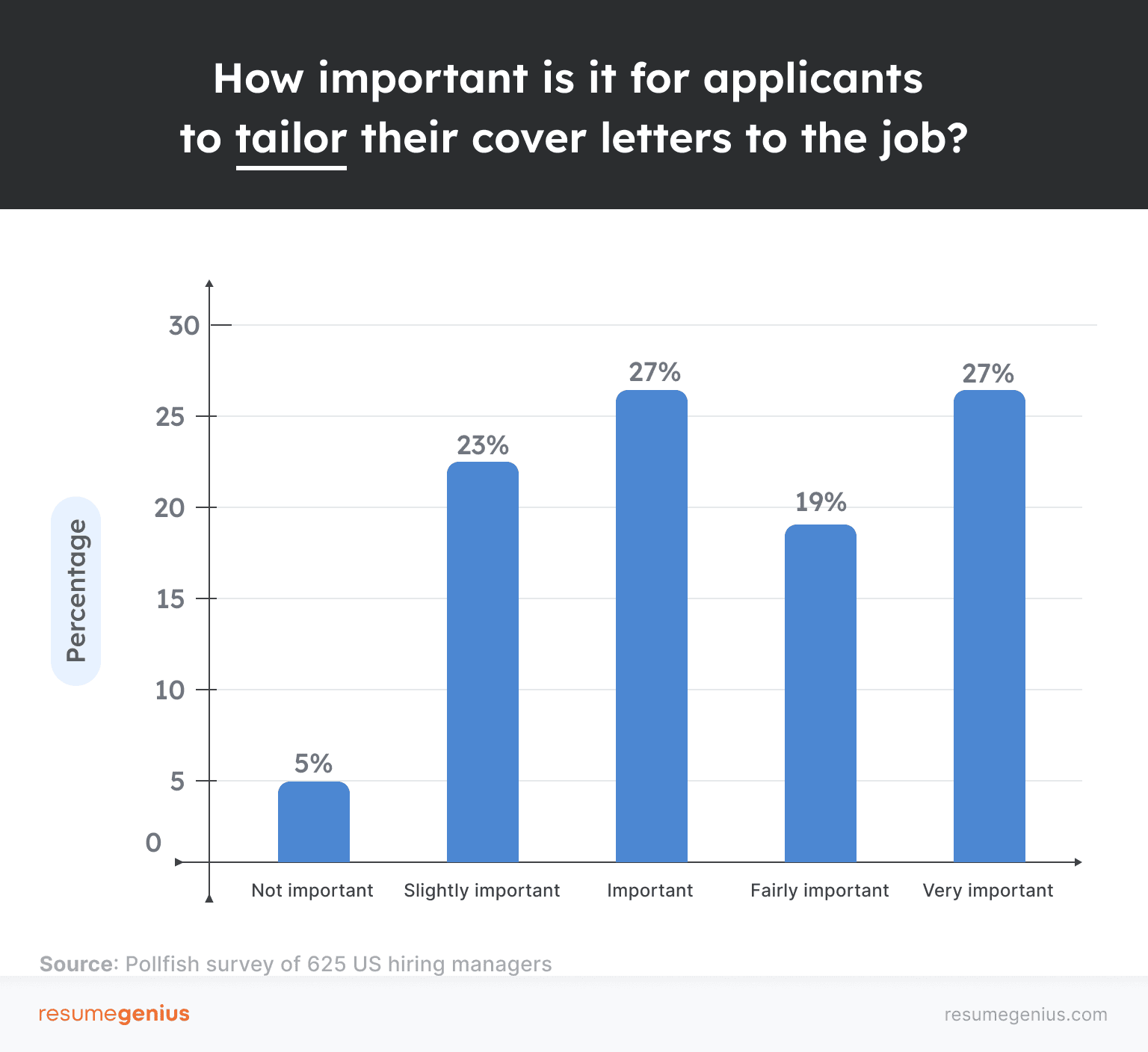
- 27% consider customizing a cover letter to be very important, compared to just 5% who consider not at all important.
- Medium and large companies (100+ employees) are about twice as likely as small companies to consider tailoring your cover letter as very important.
- Customizing your listed skills to the job posting is the most important way to tailor your cover letter.
These findings were consistent with a 2020 survey by ResumeGo, which found that 78% of hiring managers say it’s easy to tell when an applicant has invested time into tailoring their cover letter.
How should I address and submit my cover letter?
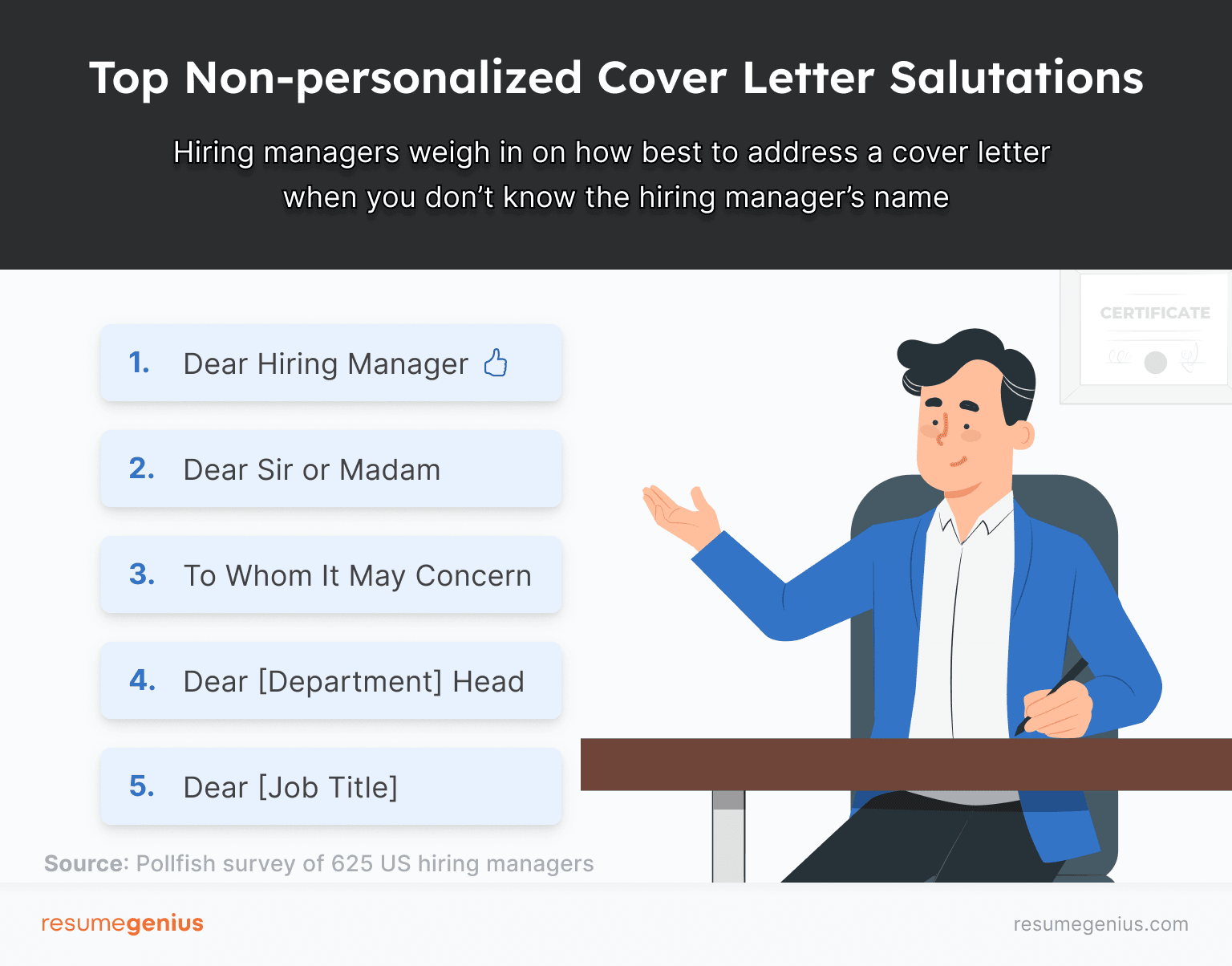
According to our 2023 survey:
- Hiring managers consider addressing them by name in the salutation as the least important customization of your cover letter.
- “Dear Hiring Manager” is the most preferred generic salutation and “Dear [Job Title]” was the least preferred.
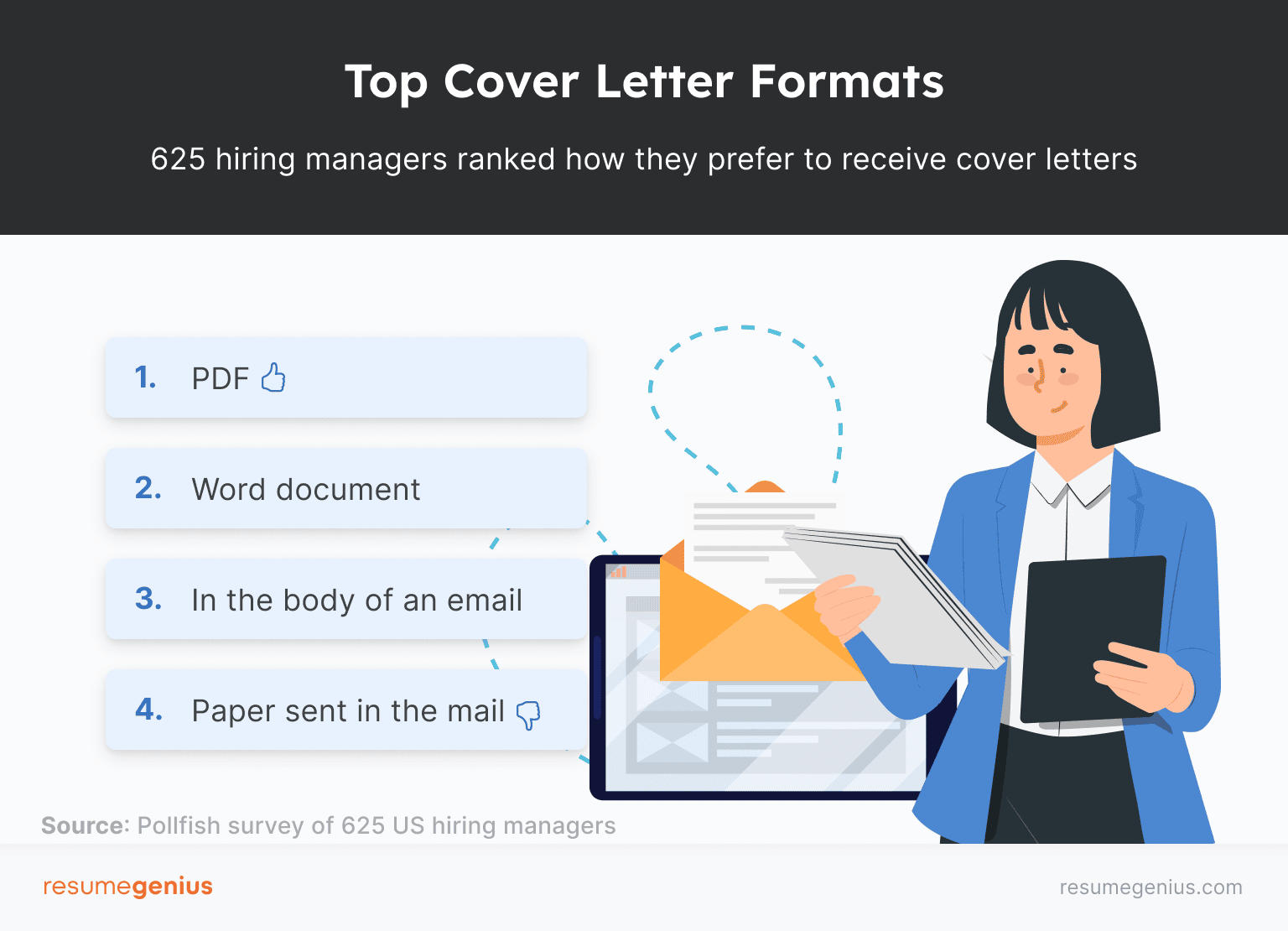
- Hiring managers prefer to receive cover letters as PDFs — receiving cover letters as paper documents in the mail is the least preferred format.
- Among hiring managers who read cover letters, the average preferred length for a cover letter is 400 words.
- Hiring managers who view cover letters as important tended to prefer longer cover letters.
What is the most important part of my cover letter?
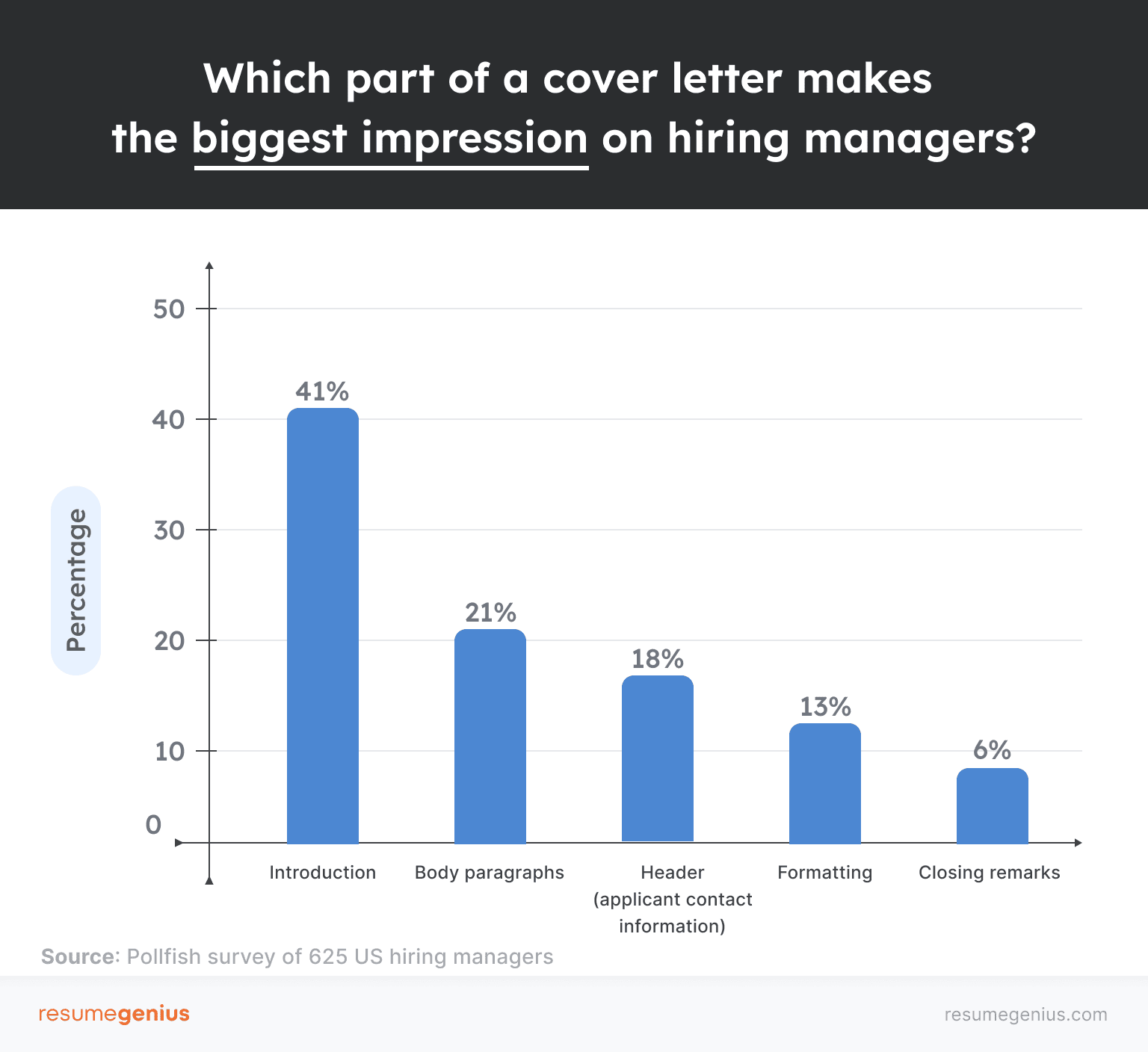
In our 2023 survey:
- 41% of hiring managers reported that the introduction of a cover letter leaves the biggest impression on them.
- 21% reported that the body paragraphs leave the biggest impression.
- 18% said the header containing the applicant’s contact information was the most important section.
- Only 13% reported that the cover letter format left the biggest impression, and 6% said it was the closing remarks. However, it’s always important to ensure that these sections are error-free.
Survey methodology
Resume Genius surveyed 625 hiring managers using Pollfish. Survey respondents listed ‘hiring manager’ as either their main role or as one of their job duties, and were 55% male, 45% female. Percentages from our survey have been rounded to the nearest percentage point for ease of reference. All analysis was performed using R. For access to data, please contact geoff@resumegenius.com.
Sources
- GetCoverLetter, “HR Statistics You Need to Know for 2023”
- Ladders, “Do Cover Letters Still Matter? Here’s What Data Shows”
- ResumeGo, “Cover letters: Just How Important Are They?”
- ResumeLab, “Is a Cover Letter Necessary in 2023? Do I Need a Cover Letter in 2023?”
About Resume Genius
Since 2009, Resume Genius has combined innovative technology with leading industry expertise to simplify the job hunt for people of all backgrounds and levels of experience.
Resume Genius’s easy-to-use resume builder and wide range of free career resources, including resume templates, cover letter samples, and resume writing guides, help job seekers find fulfilling work and reach their career goals. Resume Genius is led by a team of dedicated career advisors and HR experts and has been featured in The New York Times, Forbes, CNBC, and Business Insider.
For media inquiries, please contact us.
Click to rate this article
4.6 Average rating





